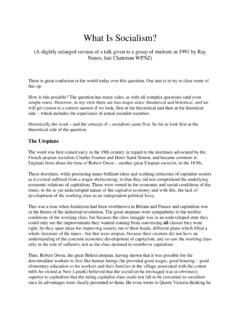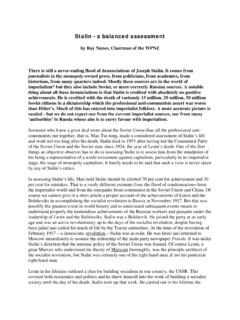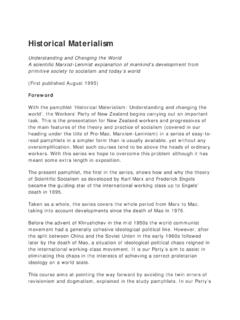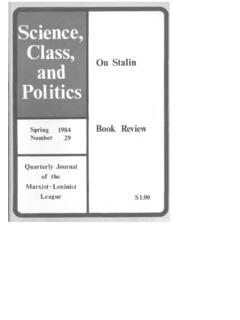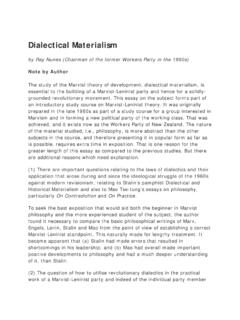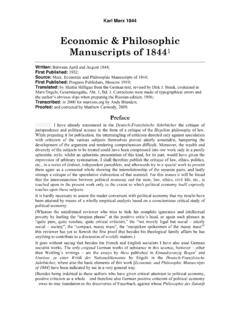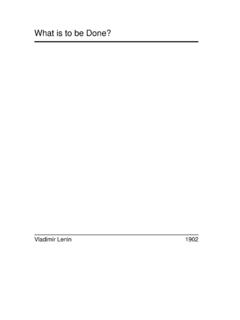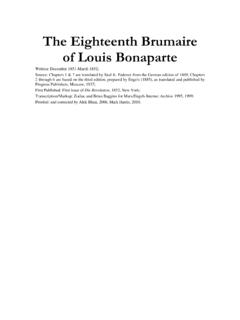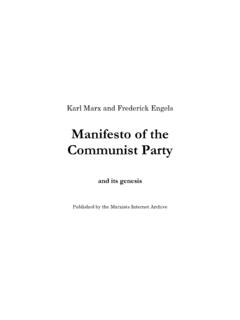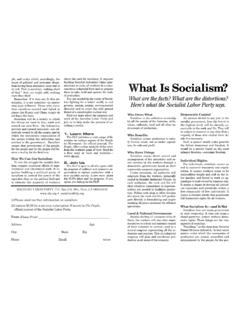Transcription of Socialist Ideals - Marxists Internet Archive
1 Socialist Idealsby Eugene V. DebsPublished in The Arena, vol. 40, whole no. 227 (Nov. 1908), pp. socialism is a political movement with an industrial pur-pose, and, because it pays chief attention to the bread-and-butter problem, has been called materialistic, it is really the most idealistic movement of the centuries. So idealistic is it in its aims that, while having no specific religious tendency or purpose, it partakes some-what of the nature of a religious movement and awakens something of a religious enthusiasm among its course there are misconceptions of socialism . These neither agitate nor surprise the Socialist , because they are to be expected. Without referring to any of them categorically, believe me when I say that socialism is not so much a cut-and-dried program as it is a method by which industry is to be operated.
2 It does not say what it will do or what you shall do, but only that the people, the workers and producers, shall be master of themselves and do with industry and the proceeds of their toil what they may think best. It is a con-tinuation of the old fight against monarchy and in favor of democ-racy, which was begun in 1776, and which has since been growing into an enlarged the ideal was for the overthrow of the political autocracy that prevailed and the establishment of political democracy in its stead. After our forefathers won in that revolution of blood, the ideal inspired France to a glorious but unintelligent struggle for popular rule, and it has been growing and spreading ever since, until now it is only here and there, in isolated places, that political autocracy pre-vails; for even though England may have a king and Germany an em-peror, they both have constitutions and parliaments elected by the people.
3 Democracy has been so successful that it is safe to say that the people will never permit a return to absolute kingly is merely an extension of the ideal of democracy into the economic field. At present, industry is ruled by the owners of the 1machines of production and distribution, who have literally the power of life and death over the subjects. There are now, in round numbers, 17 millions and a half people in America who are wage-workers and dependents on others for means of life. There are at least 30 million more who are dependents on the wage-workers for a live-lihood. But these are not the only people who are affected by the monarchy that prevails in industry. In many lines the prices of neces-sary articles of consumption are fixed arbitrarily, and in all cases a tribute of profit is exacted on all things bought and all things these means the entire people are constrained and made helpless before the system.
4 Under political absolutism the emperor did not kill unless there was at least the semblance of crime, but un-der industrial absolutism the masters of the machine may cut off the means of life at their will and without charge or trial, so that the in-nocent, the helpless, are left without means whereby they may live. socialism proposes to put industry in control of the people so that they may no longer be dependents on others for a job, so that they may be freed from the tribute of profit, and so that they may manage industry in their own way, as seems best to is evident that our forefathers who established political democ-racy in America could not have known all the uses to which democ-racy would be put through the years; they only believed that the peo-ple would fare better if they were permitted to manage the govern-ment for themselves than if a few private individuals should manage it for private good, and on these principles were ready to risk the fu-ture.
5 Few there are today who will deny that their judgement was sound. today the Socialist does not pretend to forecast what measures the people will take under popular rule of industry. He only believes in the people, that it will be better and safer for them to manage in-dustry in their interest, than it will be to longer permit the owners of the machine to dominate industry in their private is not entirely a new and untried principle, but only an exten-sion of the principle for which our forefathers struggled in 1776. We do not need, like them, to resort to arms, but may use the democracy they bestowed on us as a means for obtaining further democracy; in the sense that political democracy is to be used as a means for the ob-taining of industrial democracy is socialism a political movement, and in no other sense.
6 It will necessarily differ largely from political democracy in its application, and it is believed, will be the comple-tion of the system begun so long ago that will make it automatic and 2simple in operation and successful in the solution of the problems that have hitherto baffled the ages. We know not what the people will do when they control the means by which they make their living, but we believe they will use them in their own interest and with a reason-able degree of intelligence. If they do, they can accomplish these re-sults:They can make it so no one who wants to do productive labor can be deprived of the opportunity of doing it, at any can make it possible to banish want from the face of the can make it possible for every family to have a home and to be immune from the fear of want for themselves and their can make it possible for every child to have a good educa-tion, to be able to see the world, and to make its way without the least danger of losing out can make it possible for every man to marry and support a family in comfort and can make it possible for every woman to be free economi-cally, so that she may get along whether she marries or are part of the Ideals that the Socialist cherishes.
7 They are not mere visions, but are things that may be wrought into concrete form, whenever men shall have free access to the means with which things are produced and distributed. They have been impossible of attainment in the past, only because the earth and its fullness was held from the people by either political or industrial masters. In brief, socialism holds as its great ideal that freedom of action which shall make the making of a living a simple, easy thing, possible to all; and beyond this lies the greater hope of being able to live, to really we have been engaged in a struggle for bread. We have been so busy seeking to make a living that we have not been able to make a life. So there have been no real men and no noble women in the world, in the high sense which they may be when men and women are free.
8 If socialism meant the solution of the bread-and-butter problem alone then it would be the most wonderful idea ever given to earth, for with all our philosophy and with all our machinery we have not yet accomplished this. If it meant the solution of the bread-and-butter problem only, even then it would surpass all other movements the world has seen, because it would mean an end of the slum and the sweatshop, of child slavery and white slavery, of the 3worry that kills and the anxiety that ages and destroys both temper and it will mean infinitely more than this. When the bread-and-butter problem is settled and all men and women and children, the world around, are rendered secure from dread of war and fear of want, then the mind and soul will be free to develop as they never were before. We shall have a literature and an art such as the troubled heart and brain of man never before conceived.
9 We shall have beauti-ful houses and happy homes such as want could never foster or drudgery secure. We shall have beautiful thoughts and sentiments, and a divinity in religion, such as man weighted down by the ma-chine could never have the best you can of good and beauty now, and it is only a rude and grotesque conception of that which will be possible when man is really free by virtue of being master of his own life and free from the mastery of the devils of want and in its primaries is a great conception, a masterful long-ing, a transfiguring ideal . To Israel emerging from Egypt it took the form of aspiration for a land flowing with milk and honey, where every man might sit under his own vine and fig tree. This was as ma-terialistic a conception as that which actuates the Socialist . But be-yond that was the individual desire to make of his own life the best and happiest thing he possibly could.
10 The Socialist wants the same thing. His vision of a free world is auxiliary to his ideal of making his own life better and sweeter. And when freedom comes, when the vi-sion enlarges because of the horizon lifting with the higher plane man takes, then the ideal will expand beyond what is beheld now, until it reaches a grandeur such as eye hath not seen, or ear heard, or it hath entered into the heart of man to V. Debs,Terre Haute, by Tim Davenport1000 Flowers Publishing, Corvallis, OR January 2014 Non-commercial reproduction permitted.
